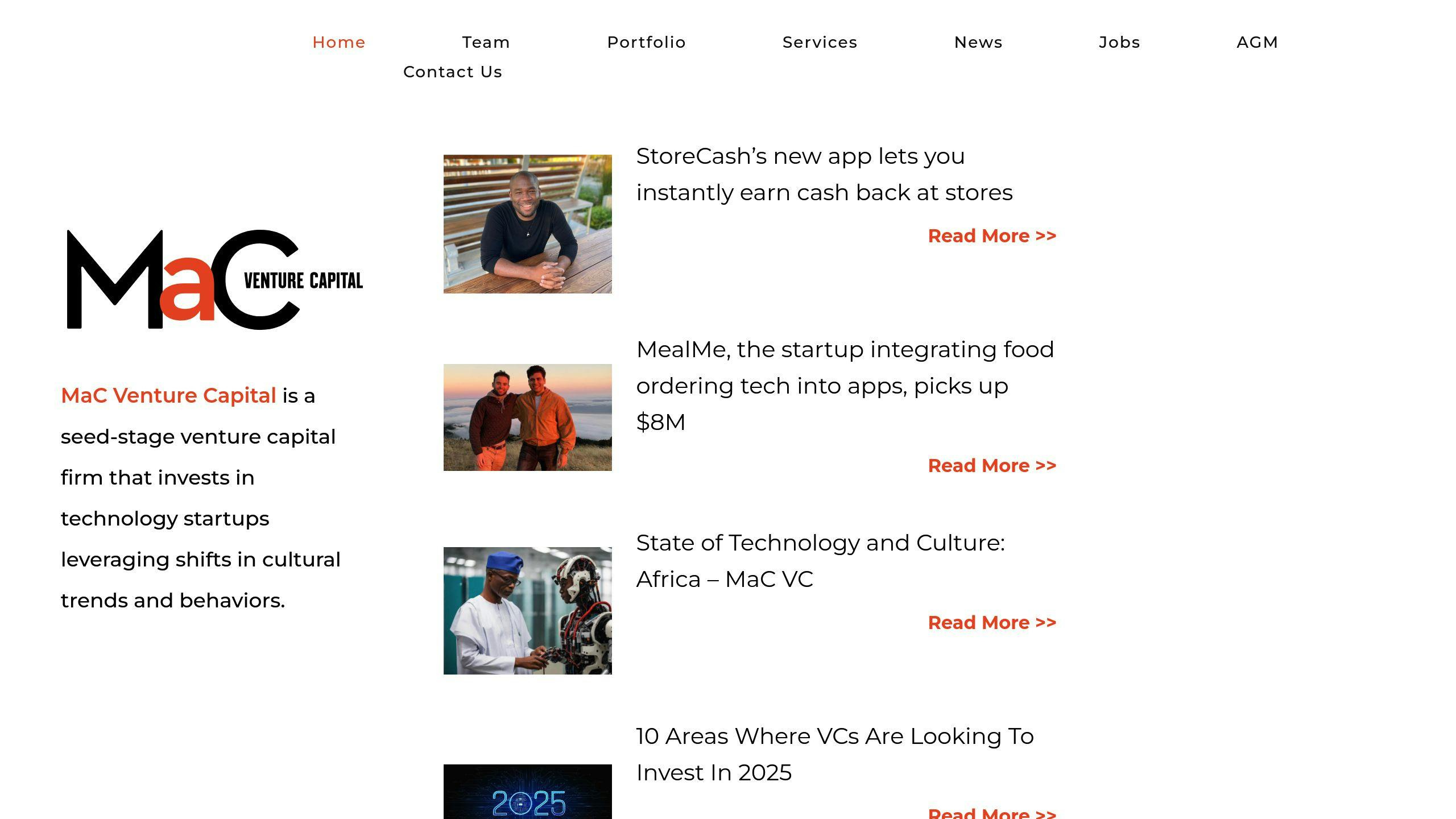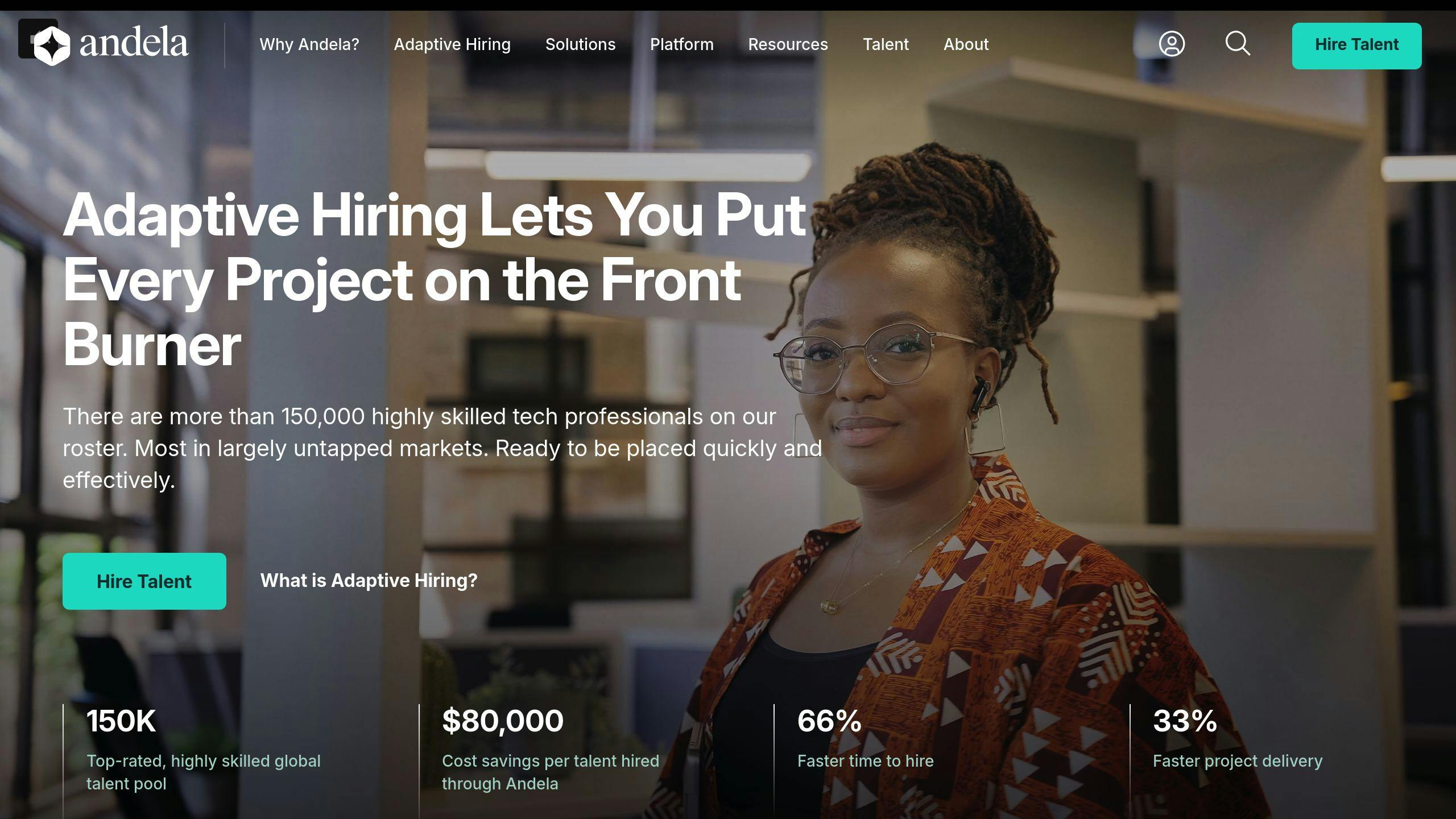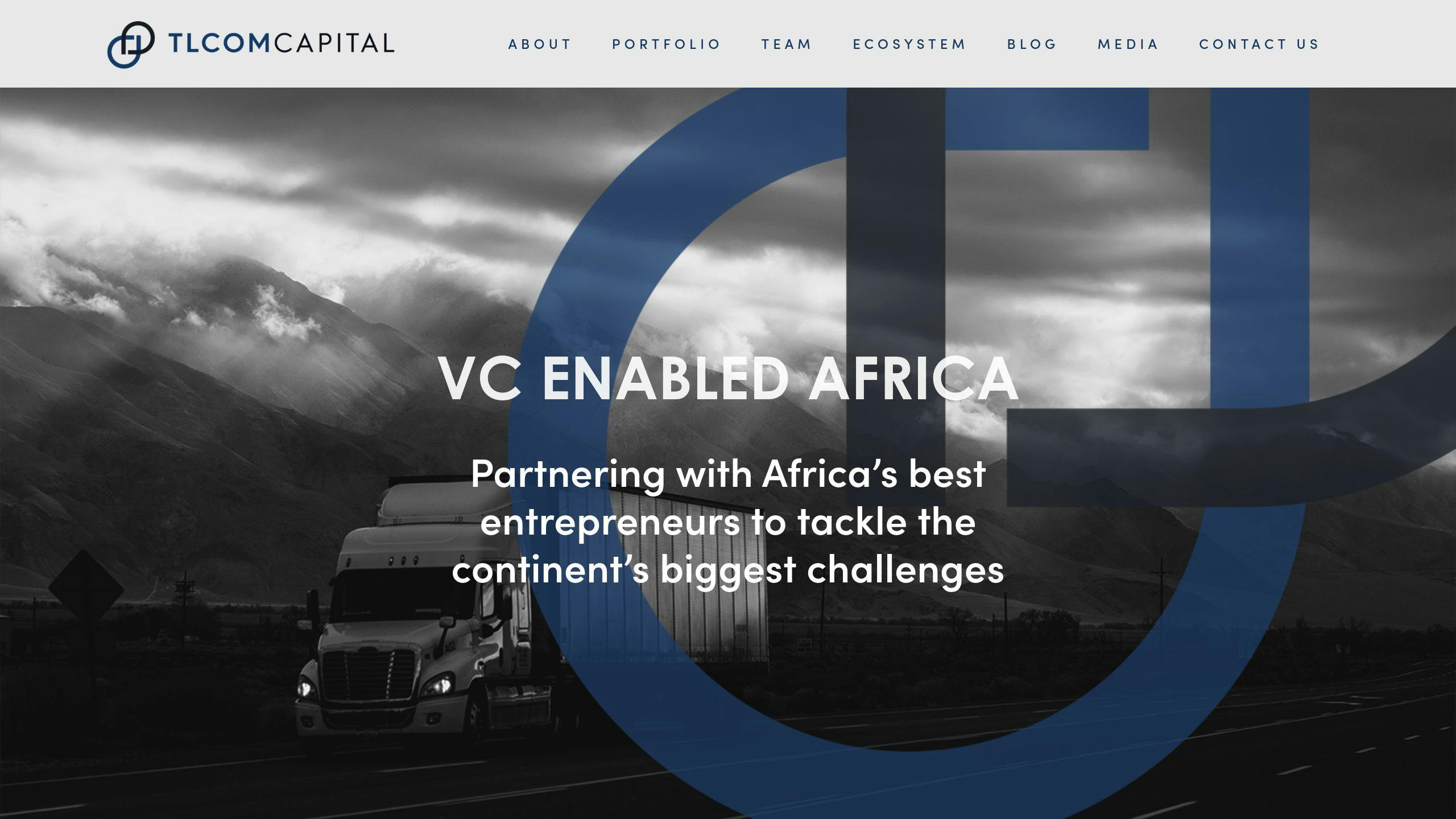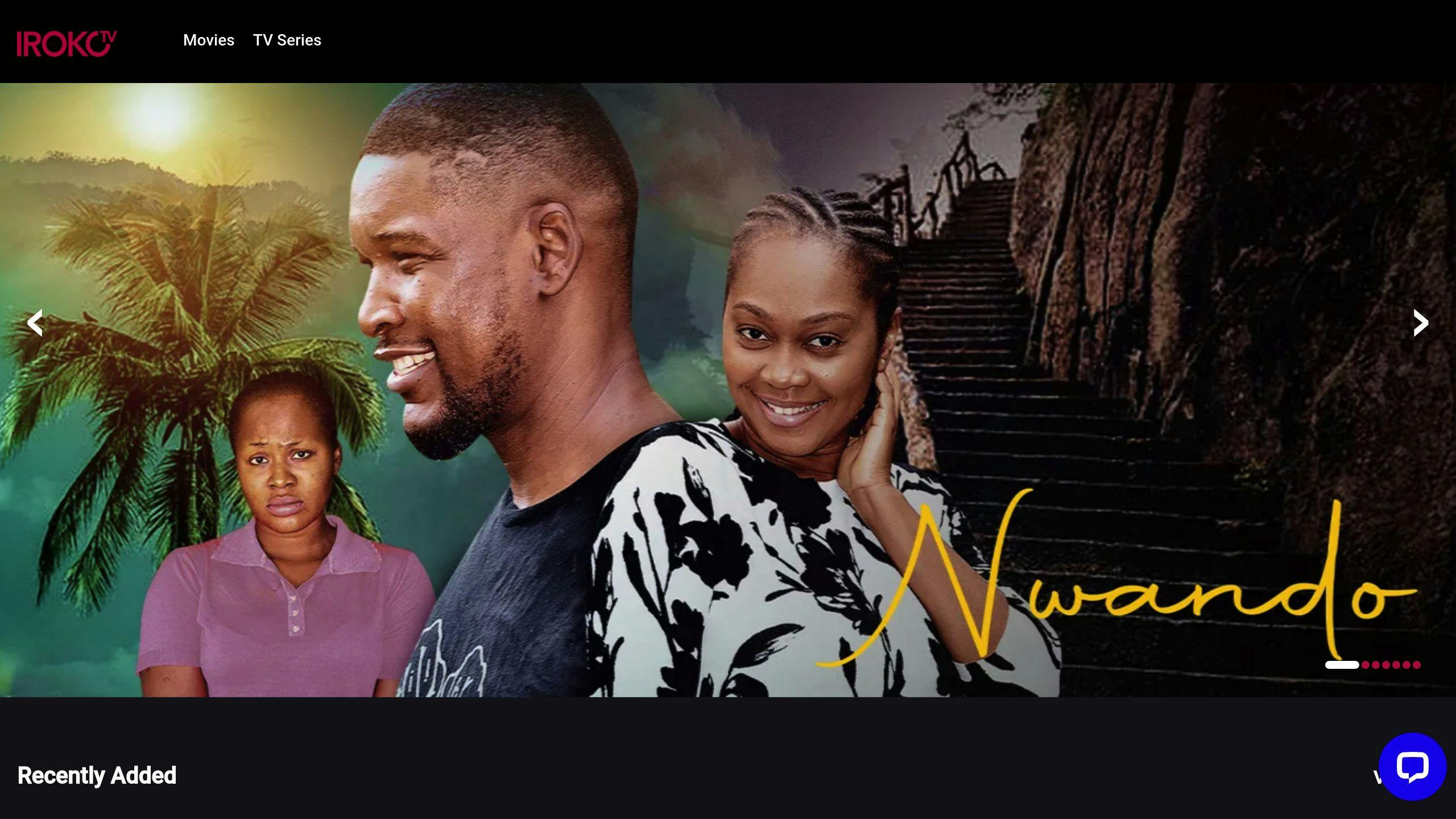Africa’s tech scene is booming, driven by a young population, increasing mobile adoption, and growing international interest. These 10 investors are shaping the continent’s tech ecosystem by funding startups, mentoring entrepreneurs, and solving critical challenges like infrastructure gaps and regulatory hurdles. Here’s who to watch:
- Marlon Nichols (MaC VC): Focuses on Series A funding for scalable startups in fintech, healthtech, and digital commerce.
- Iyinoluwa Aboyeji (Future Africa): Invests in early-stage startups tackling local problems with scalable solutions in fintech, edtech, and healthtech.
- Omobola Johnson (TLcom Capital): Backs ventures in fintech, healthcare, and digital infrastructure, emphasizing scalable business models.
- Maurice Ostro (Entrepreneur First): Supports early-stage startups in fintech, healthtech, and edtech with funding and mentorship.
- Yemi Lalude (TPG Growth): Invests in tech-driven businesses addressing Africa’s unique needs, with a focus on fintech and e-commerce.
- Eghosa Oriaikhi Mabhena (Puma Energy): Focuses on energy infrastructure to support Africa’s digital transformation.
- Babajide Sanwo-Olu (Governor of Lagos): Advances tech through government initiatives like innovation hubs and simplified regulations.
- Samuel Mensah (KISUA): Invests in e-commerce and digital retail startups, leveraging his experience in fashion tech.
- Jason Njoku (iROKO): Pioneers digital entertainment and supports startups in media, fintech, and e-commerce.
- Sim Shagaya (Konga): Mentors startups in e-commerce and fintech, focusing on cross-border trade opportunities.
These investors are driving change by combining local insights with global networks, ensuring Africa’s tech ecosystem continues to grow. Whether you’re an entrepreneur or an observer, these names are shaping Africa’s digital future.
Reset: The New Venture Capital Landscape
1. Marlon Nichols – Managing Partner at MaC VC

Marlon Nichols, the Managing Partner at MaC Venture Capital, plays a key role in Africa’s tech investment scene. His firm focuses on early-stage investments in fast-growing sectors like fintech, healthtech, digital commerce, and information services [2].
Nichols highlights the importance of Series A funding in helping startups grow, especially in Africa, where most deals are under $5 million [2]. His approach is grounded in a strong understanding of Africa’s market challenges, such as regulatory issues and currency instability, which he views as chances to develop creative solutions [2].
Nichols doesn’t stop at providing funding. He offers strategic advice, builds international networks for startups, and shares research on market opportunities [2]. With Africa’s young population driving innovation, he targets startups capable of scaling across the continent while maintaining financial stability [2][3].
MaC VC has built a reputation for spotting technologies that tackle core market needs [2]. Nichols advocates for a mix of local and international investors. Local investors are essential for early-stage funding, while international investors are key for helping startups grow, especially during the Series A stage [2][3].
Through his efforts, Nichols is not just investing in startups – he’s addressing gaps in Africa’s tech funding ecosystem. His focus on high-growth, scalable startups is influencing how other investors approach Africa’s tech future [2].
2. Iyinoluwa Aboyeji – Co-founder of Andela and Future Africa

Iyinoluwa Aboyeji is channeling early-stage investments through Future Africa to tackle some of the continent’s biggest challenges. Known for co-founding Andela, Aboyeji has become a key player in Africa’s tech investment space, shaping the future of startups across the region [2].
Future Africa focuses on startups in fintech, healthtech, and edtech, zeroing in on those with the potential to grow beyond their local markets [2][3]. Drawing from his Andela experience, Aboyeji emphasizes scalable solutions tailored to Africa’s unique needs while also attracting international investors [2].
With mobile adoption surging toward 2025, Aboyeji has identified four priorities: mobile technology, solving local problems, scaling across borders, and nurturing talent [2]. His approach goes beyond just funding; it includes mentorship, ecosystem development, and advocating for regulatory and infrastructure improvements to support tech entrepreneurs [2][3].
Aboyeji sees Africa’s regulatory and infrastructure hurdles as opportunities to innovate. Future Africa backs startups that combine technology with practical, sustainable solutions, helping them navigate these challenges while achieving steady growth [2].
A standout example from his portfolio is Flutterwave, showcasing his commitment to supporting ventures that address local needs while scaling across the continent. Through Future Africa, Aboyeji is helping to shape a thriving tech ecosystem in Africa [2][3].
3. Omobola Johnson – Partner at TLcom Capital

Omobola Johnson, a Partner at TLcom Capital and former Nigerian Minister of Communication Technology, uses her public and private sector experience to fuel investments in Africa’s growing tech space [2]. TLcom Capital backs tech businesses with the potential to scale across Africa, with standout investments like Terragon (data analytics) and Twiga Foods (agritech) making waves in their industries [2].
Her investment focus covers three dynamic sectors: fintech, healthcare technology, and digital infrastructure [2]. One example is FairMoney, a company that has secured $57M to build the leading mobile bank and bring financial inclusion to the underbanked in emerging markets.[2][3].
Johnson also plays a significant role in shaping Africa’s tech future through her work on the boards of a number of leading Nigerian and multi-national corporations[2].These positions allow her to influence policies that encourage innovation while addressing infrastructure gaps across the continent.[2].
For startups seeking TLcom Capital’s backing, Johnson stresses the importance of scalable business models that can grow beyond local markets [2]. She looks for companies with solid unit economics that tackle fundamental challenges facing Africa [2][3].
Through her investments and leadership in the tech ecosystem, Johnson is helping to drive scalable solutions across Africa, setting an example for other investors in the region [2].
4. Maurice Ostro – Chairman of Entrepreneur First

Maurice Ostro, the Chairman of Entrepreneur First, leads efforts to fund early-stage African tech startups, particularly in fintech, healthtech, and edtech. With active operations in Nigeria and Kenya, Entrepreneur First helps young founders create scalable solutions tailored to Africa’s specific needs [1].
Under Ostro’s guidance, Entrepreneur First offers more than just funding. The organization provides mentorship, resources, and access to a global network. Entrepreneur First’s portfolio has a combined valuation of over $10 billion worldwide, highlighting the effectiveness of this approach [1]. In Africa, the organization has fine-tuned its talent investment model to align with local market conditions while keeping scalability and growth at the forefront.
Ostro’s investment strategy focuses on tackling Africa’s core challenges. In fintech, he supports startups addressing the needs of the unbanked population and leveraging the rise of mobile payments. In healthtech, his focus is on improving access to affordable healthcare. Meanwhile, his edtech investments aim to meet the educational demands of Africa’s rapidly growing population [2].
For entrepreneurs looking for funding, Ostro stresses the importance of understanding local markets while building solutions that can expand beyond regional limits. His approach favors startups with strong financial fundamentals and clear paths to profitability [2].
Ostro’s work highlights how global investors are reshaping their strategies to align with Africa’s opportunities, playing a key role in the development of the continent’s tech ecosystem [1][2].
5. Yemi Lalude – Managing Partner at TPG Growth

Yemi Lalude plays a major role in shaping Africa’s tech investment scene. As the Managing Partner at TPG Growth, he oversees a portfolio that has invested over $1 billion in African companies since 2015. His work centers on supporting tech-driven businesses that address the unique needs of the continent [1].
Lalude zeroes in on three key sectors: fintech, healthtech, and digital commerce. He supports ventures that tap into the rise of mobile technology and e-commerce to tackle pressing challenges in Africa. Under his leadership, TPG Growth’s portfolio has backed businesses driving digital innovation across the region.
What makes Lalude stand out is his hands-on approach to investment. Beyond funding, he actively contributes to Africa’s tech ecosystem through mentorship and policy discussions. By connecting international investors with local innovators through industry events, he helps create meaningful, long-lasting change.
For startups seeking investment, Lalude prioritizes ventures with scalable business models, smart use of technology, solid unit economics, and teams with strong leadership and deep market expertise. This focus has helped portfolio companies grow steadily while adhering to global standards.
Through TPG Growth’s investments, Lalude shows how global venture capital can successfully collaborate with African entrepreneurs to build thriving businesses. His ability to combine international knowledge with local insights continues to shape Africa’s growing digital economy and inspires other investors to follow suit.
sbb-itb-dd089af
6. Eghosa Oriaikhi Mabhena – CEO of Puma Energy

Eghosa Oriaikhi Mabhena, the CEO of Puma Energy, plays a key role in supporting Africa’s tech ecosystem by focusing on the continent’s energy infrastructure. Her efforts are centered on building the essential systems that fuel technological progress across Africa.
Under her leadership, Puma Energy invests in renewable energy technologies, energy storage solutions, and smart grid systems. These investments are directly tied to advancing the digital transformation of African businesses and communities [1].
Puma Energy has also partnered with tech companies to create advanced energy solutions [2]. By moving beyond traditional energy distribution, the company has established itself as an important player in driving technological growth in Africa [1].
Mabhena urges African entrepreneurs to take a broader view of tech, emphasizing the importance of energy infrastructure for long-term growth [2]. Her vision encourages tech startups to see infrastructure partnerships as a key part of their growth strategies.
Instead of directly funding startups, Mabhena focuses on building the infrastructure needed for tech growth [1]. This approach highlights how companies in traditional industries can adapt to meet the demands of a tech-driven continent. By tackling Africa’s energy challenges, Mabhena sets the stage for the tech sector to flourish, positioning herself as a major force behind Africa’s digital transformation [2].
7. Babajide Sanwo-Olu – Governor of Lagos State, Nigeria
Babajide Sanwo-Olu, the Governor of Lagos State, plays a central role in advancing Africa’s tech ecosystem. His administration focuses on building an environment where innovation thrives, using initiatives like the Lagos State Science and Technology Agency (LASTA) and the Lagos State Employment Trust Fund (LSETF) to provide financial support and training for tech entrepreneurs.
Under his leadership, Lagos has seen major advancements in its tech landscape. Efforts include smart city projects, improved internet connectivity, simplified startup registration processes, and the establishment of innovation hubs. Collaborations with major players like Google and Microsoft have also boosted digital literacy programs, solidifying Lagos as a competitive destination for tech investments [1]. These efforts have attracted interest from both local and global investors.
Sanwo-Olu has been instrumental in connecting international tech companies with local startups, creating opportunities for knowledge exchange and investment. This strategy has strengthened the region’s digital infrastructure and tech education while addressing key challenges in the ecosystem.
By focusing on reliable internet access, simplified regulations, and government-backed funding, his administration supports the long-term growth of Lagos’s tech sector. These measures have not only encouraged local startups but have also drawn international funding, further establishing Lagos as a leading tech hub in Africa [1][2].
Sanwo-Olu’s leadership demonstrates how government initiatives can work alongside private investment to drive tech innovation in Africa.
8. Samuel Mensah – Founder of KISUA

Samuel Mensah has made a mark in Africa’s tech investment scene by blending entrepreneurial know-how with a focus on digital retail. As the founder of KISUA, a fashion e-commerce platform, he has shown a sharp ability to tap into opportunities within Africa’s growing digital retail sector.
Mensah’s investment strategy zeroes in on early-stage startups in e-commerce and digital retail. Drawing from his own experiences, he targets businesses that cater to underserved consumer markets. The success of KISUA highlights his skill in building scalable platforms that connect African businesses with global markets, underlining his deep insight into local consumer trends.
Beyond investing, Mensah plays a dual role as both an investor and mentor in the African tech space. He helps startups create business models that are both resilient and suited to local conditions, while also scalable for international growth. His expertise in tackling regulatory and infrastructure challenges has proven especially valuable for ventures focused on logistics and payment systems across Africa.
Looking ahead to 2025, Mensah is prioritizing digital retail solutions that enable cross-border trade while addressing infrastructure gaps. His efforts align with infrastructure-focused investors like Eghosa Oriaikhi Mabhena, creating a well-rounded support network for African tech growth.
Mensah’s work highlights how African tech companies can meet local demands while seizing global opportunities. His focus on transforming digital retail continues to influence Africa’s e-commerce landscape and inspires others aiming to drive the continent’s digital evolution.
9. Jason Njoku – Founder of iROKO

Jason Njoku has played a major role in shaping Africa’s digital entertainment scene. As the founder of iROKO, he has led the way in bringing Nollywood productions to digital platforms while also building an impressive investment portfolio in Africa’s tech sector.
His investment approach focuses on startups in entertainment, media, and technology that use digital platforms to cater to African audiences. Njoku has successfully secured over $30 million in funding for iROKO from major investors like Tiger Global and Kinnevik, proving his ability to attract significant capital to African ventures [1].
In 2025, Njoku is concentrating on three main areas to drive Africa’s digital growth:
- Digital content production and streaming platforms, with a goal of producing more than 300 hours of content annually.
- Fintech solutions, focusing on payment systems and digital banking for the African market.
- E-commerce platforms, aimed at enabling seamless cross-border trade [2].
What makes Njoku’s work impactful is his ability to combine a deep understanding of local markets with a global vision. iROKO’s successful expansion into countries like Nigeria, Ghana, and Kenya highlights the potential for scaling digital platforms across Africa’s diverse markets [1].
Njoku also tackles challenges like infrastructure gaps and regulatory hurdles by backing startups that bring innovative solutions to Africa’s entertainment and digital media sectors. He looks for businesses that balance local market needs with the ability to scale globally, reinforcing his role as a major figure in Africa’s tech ecosystem [2].
Looking ahead to 2025, Njoku is sharpening his focus on startups that can navigate Africa’s unique challenges while building scalable solutions. His experience with digital platforms and tech-driven strategies cements his position as a leading force in advancing Africa’s entertainment and technology industries [1][2].
10. Sim Shagaya – Founder of Konga

Sim Shagaya has made a strong impact on Africa’s tech investment scene, focusing on early-stage startups in e-commerce, fintech, and digital services. During his time leading Konga, the company raised $25 million and reached a $200 million valuation before being acquired by Zinox Group in 2018 [1][2].
Shagaya concentrates on areas like digital commerce, fintech, and digital infrastructure, aiming to improve financial access, cross-border trade, and supply chain processes. His deep understanding of Africa’s diverse markets plays a key role in shaping his investment strategies.
“Africa is not a country, it’s a continent. And in that continent, there are 54 different countries, each with its own unique characteristics.”
He views the African Continental Free Trade Area (AfCFTA) as a major opportunity for startups to expand regionally by 2025. His approach focuses on businesses that can tap into this agreement to grow across various African markets.
More than just providing funding, Shagaya mentors startups, pushes for policy changes, and uses his experience with Konga to guide the growth of the tech ecosystem. His hands-on involvement and market expertise have solidified his role as a key player in African tech investment.
Shagaya continues to combine cutting-edge technology with practical market knowledge to drive progress. Through his investments and mentorship, he plays a major role in shaping Africa’s digital economy and supporting its ongoing growth [1][2].
Conclusion
The African tech investment scene in 2025 reflects impressive growth and change, fueled by investors who are shaping the continent’s digital economy. These ten key investors have shown dedication through well-placed investments in areas like fintech, healthtech, and digital commerce.
Their portfolio companies have hit major milestones, tackling pressing issues across Africa. By focusing on scaling startups and addressing challenges such as infrastructure gaps, these investors are playing a crucial role in advancing the continent’s tech landscape.
By blending global expertise with local market insights, these investors are helping startups overcome hurdles like infrastructure and regulatory issues. This strategy has been particularly effective in connecting local innovation with global opportunities.
Programs like the African Development Bank’s Boost Africa initiative and the Africa Business Angel Network are also supporting this upward trend. Entrepreneurs can connect with these investors by participating in industry events, using platforms like the Africa Business Angel Network, and staying informed through relevant publications and social media.
As Africa’s tech ecosystem matures, these investors are driving progress, encouraging entrepreneurship, and creating lasting impact. Their efforts are not only helping individual startups succeed but are also reshaping the wider tech economy across the continent, paving the way for a thriving digital future.
Related posts
- Top 7 EdTech Startups for Digital Skills in Africa
- 8 Solutions to Common African E-commerce Challenges
- African Tech Hub Comparison: Lagos vs Nairobi vs Cape Town
- How Digital Skills Training Boosts African Startups





